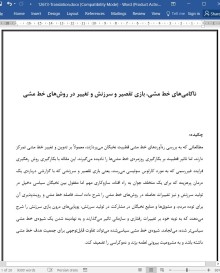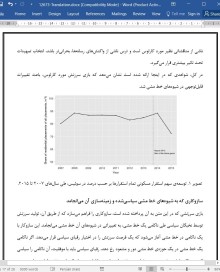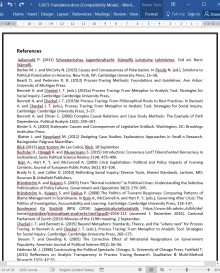
دانلود مقاله ناکامی های خط مشی، بازی تقصیر و سرزنش و تغییر در روش های خط مشی
چکیده:
مطالعاتی که به بررسی رهآوردهای خط مشی قطبیت نخبگان میپردازند، معمولاً بر تدوین و تغییر خط مشی تمرکز دارند، اما تاثیر قطبیت بر بکارگیری روزمرهی خط مشیها را نادیده میگیرند. این مقاله با بکارگیری روش رهگیری فرایند غیررسمی که به مورد کارلوس سوئیسی میرسد، یعنی بازی تقصیر و سرزنشی که با گزارشی دربارهی یک درمان پرهزینه که برای یک متخلف جوان به راه افتاد، سازوکاری مهم اما مغفول بین نخبگان سیاسیِ دخیل در تولید سرزنش و نیز تغییرات حاصله در روشهای خط مشی را شرح داده است. فاصله خط مشی و رویتپذیری آن برای توده مردم، و مشوقها و منابع نخبگان در مشارکت در تولید سرزنش، پویاییهای درون بازی سرزنش را شرح میدهند که به نوبه خود بر تغییرات رفتاری و سازمانی تاثیر میگذارند و به نهادینه شدن یک شیوهی خط مشی سیاسیتر شده، میانجامد. شیوهی خط مشی سیاسیشده میتواند تفاوت قابلتوجهی برای جمعیت هدف خط مشی داشته باشد و به مشروعیت بیرونی لطمه بزند و دموکراسی را تضعیف کند.
مقدمه
قطبیت نخبگان، یک پدیدهی بسیار رایج در بسیاری از دموکراسیهای غربی است. مطالعاتی که به بررسی رهآوردهای خط مشی قطبیت نخبگان پرداختهاند، معمولاً بر حوزهی سیاسی تمرکز دارند که در آن حوزه، به تعارضات سیاسی در زمینه خط مشی پرداخته میشود، خط مشیهای جدیدی خلق شده و خط مشیهای موجود نیز تغییر مییابند (لایمان و همکاران، 2006). اما تحقیق در زمینه ثبات و تغییر، که صرفاً بر تصمیمات خط مشی متمرکز باشد، فقط یک ارزیابی نسبی از قطبیت نخبگان ارائه میدهد. این تحقیقات به ما نمیگویند که آیا قطبیت نخبگان بر شیوهی خط مشی تاثیر میگذارند، یعنی بر بکارگیری روزمرهی خط مشیهایی که بطور رسمی تغییر نیافتهاند. این پرسشها را باید پاسخ داد تا به تصویری کاملتر از روشهایی دست یافت که در آن، افزایش قطبیت نخبگان، دموکراسیهای غربی را تغییر میدهد.
هدف این مقاله این است که با شرح یک سازوکار غیررسمی مهم بین نخبگان در تولید سرزنش و تغییر در شیوهی خط مشی، در ارزیابی کاملتر این موضوع مشارکت داشته باشد: ناکامی خط مشی، فرصتهایی برای نخبگان سیاسی ارائه میدهد تا سرزنشی تولید کنند که مخاطب آن، مقامات سیاسی مسئول هستند. تعاملات راهبردی طی بازی تقصیر و سرزنش، شیوهی خط مشی متمرکز بر مسالهای را برای دقت و نقد عموم، مطرح میسازد. انطباقات سازمانی که در واکنش انجام میشوند، باعث میشوند که مسئولیت با سمت بالا حرکت کند و بر مقامات ارشد تمرکز نماید، یعنی بر دوش مقامات دولتی که به دنبال کسب رای هستند. تمرکز مسئولیت روی مقامات ارشد، باعث میشود که شیوههای خط مشی، بر اساس منافع مادی مقامات دولتی استخراج شوند، یعنی کسانی که نیاز به حفاظت از شهرت و پیشهی خود در مقابل سرزنش عموم را دارند. یک شیوهی سیاسیتر شده از خط مشی میتواند تفاوت قابل توجهی برای جمعیت هدف خط مشی ایجاد کند و به مشروعیت بیرونی لطمه زند (اسکارپف 2003).
نتیجه
این مقاله به بررسی یک سازوکار مغفول اما مهم پرداخته است که ناکامیهای خط مشی سیاسیشده، از طریق آن میتوانند به شیوههای خط مشی سیاسیشده بیانجامند. خصایص خط مشی از نظر فاصله روئیتپذیری برای عموم مردم، و مشوقها و منابع نخبگان سیاسی جهت مشارکت در تولید سرزنش بابت ناکامی یک خط مشی، پویایی درون بازی سرزنش را شرح میدهد و به نوبه خود، تغییرات رفتاری و سازمانی را تحمیل میکند که به نهادینهشدن یک شیوهی خط مشی سیاسیتر شده کمک میکند.
این مقاله منفعت بالقوهی تحلیل بازی سرزنش را بعنوان یک پدیدهی متمایز نشان داده است، پدیدهای که به ما میگوید سیستمهای سیاسی به چه نحو به قطبیت فزایندهی نخبگان سیاسی واکنش نشان میدهند و خود را با آن منطبق میسازند. ارتباط پویایی پیچیدهی درون بازی سرزنش با انواع تبعات خط مشی، امکان دستیابی به یک تصویر کاملتر از شیوههایی را میدهد که در آنها قطبیت فزایندهی نخبگان، دموکراسیهای غربی را تغییر میدهد.
این رویکرد تحلیلی، به کشف پیوند بین تولید سرزنش در فضای سیاسی از یکسو و شیوههای خط مشی از سوی دیگر، انجامیده است که وعدهی شناخت و بینش بیشتری را به مخاطب میدهد. برای اکثر پژوهشهایی که به بررسی رابطه متقابل بین سیاست و خط مشی پرداختهاند، خط مشی در واقع از تدوین خط مشی و اقتباس تشکیل شده است اما بکارگیری روزمرهی خط مشیهایی که هماینک اجرا میشوند را نیز در بر میگیرد. همانطور که یافتههای این مقاله خاطرنشان میکنند، هر رویکردی که انطباقات در شیوههای خط مشی را نادیده بگیرد، ممکن است نتواند تبعات مهم تولید سرزنشِ بیشتر را مدنظر قرار دهد. تبعاتی که تفاوت زیادی برای جمعیت هدف خط مشی ایجاد میکند و در صورتی که خط مشیها به شیوههایی اِعمال شوند که تاثیر منفی بر اثربخشی خودشان بگذارند، ممکن است بر مشروعیت بیرونی آن لطمه وارد کند.
Abstract:
Studies examining the policy implications of elite polarisation usually concentrate on policy formulation and change, but neglect the impact of polarisation on the day-to-day application of policies. Applying the method of causal process tracing to the Swiss “Carlos” case, a blame game triggered by the reporting about an expensive therapy setting for a youth offender, this article exposes and explains a hitherto neglected, but highly important, mechanism between political elites engaging in blame generation and changes in policy practice. A policy’s distance and visibility to mass publics, as well as the incentives and resources of elites to engage in blame generation, explain the dynamics within blame games, which, in turn, effect organisational and behavioural changes that help institutionalise a more politicised policy practice. Politicised policy practice can make an important difference to policy target populations, as well as damage output legitimacy and undermine democracy.
Introduction
Elite polarisation is as an increasingly common phenomenon in many western democracies (Hetherington 2009; Kriesi et al. 2012). Studies examining the policy implications of elite polarisation usually focus on the political arena in which political conflicts over policy are dealt with, new policies are crafted and existing policies are changed (Layman et al. 2006). However, enquiries of stability and change solely focussing on policy decisions provide only a partial assessment of the implications of elite polarisation. They do not tell us whether, and how, elite polarisation influences policy practice, i.e. the day-to-day application of formally unchanged policies. These questions need to be answered in order to obtain a more complete picture of the ways in which increasing elite polarisation changes western democracies.
This article aims to contribute to a more complete assessment of this subject by exposing and explaining a hitherto neglected but highly important causal mechanism between political elites engaging in blame generation and changes in policy practice: policy failures provide opportunities for political elites to generate blame directed at politically responsible officeholders. Strategic interactions during “blame games” expose problem-centred, quiet policy practice to public scrutiny and criticism. Organisational adaptations made in response make responsibility travel upwards and concentrate it “at the top” – in the hands of vote-seeking officeholders. Responsibility concentration at the top makes it more likely that policy practice is driven by the material interests of officeholders who need to protect their reputation and career from public blame. A more politicised policy practice can make an important difference for policy target populations and damage output legitimacy (Scharpf 2003).
Conclusion
This article has exposed and explained a hitherto neglected but highly important mechanism through which politicised policy failures can lead to increasingly politicised policy practice. Policy characteristics in terms of distance and visibility to mass publics, as well as the incentives and resources of political elites to engage in blame generation for a policy failure, explain the dynamics within blame games that, in turn, exact organisational and behavioural changes that help institutionalise a more politicised policy practice.
This article has shown the potential gain of analysing blame games as distinct phenomena that tell us how political systems react and adapt to increased elite polarisation. Importantly, the connection of the complex dynamics within blame games with different types of policy consequences allows to obtain a more complete picture of the ways in which increasing elite polarisation changes western democracies.
This analytic approach has led to the discovery of a link between blame generation in the political sphere on the one hand and policy practice on the other, which promises to produce new insights. For much research studying the interrelations between “politics” and “policy”, “policy” actually comprises policy formulation and adoption but eclipses the day-to-day application of policies already in place. As the findings of this article indicate, any approach that neglects adaptations in policy practice may fail to account for important consequences of increased blame generation that make a huge difference for policy target populations and may damage output legitimacy if policies are applied in ways that negatively influence their effectiveness.
چکیده
مقدمه
انطباقات رفتاری برای یک جو قطبیشده: یک دیدگاه خُرد
طرح پژوهشی
مورد کارلوس
تحلیل مورد
تولید موفق سرزنش
پویاییهای بازی تقصیر و سرزنش
پیامدهای شیوههای خطمشی
سازوکاری که به شیوههای خطمشی سیاسیشده و زمینهسازی آن میانجامد
خصایص خطمشی
منابع
فرصتهای متوقفسازی بازی سرزنش
اختیار تصمیمگیری
نتیجه
منابع
Abstract
Introduction
Behavioural adaptations to a polarised climate: a microperspective
Research design
The Carlos case
Case analysis
Successful blame generation
Blame game dynamics
Consequences for policy practice
The mechanism leading to politicised policy practice and its contextualization
Policy characteristics
Resources
Opportunities to halt a blame game
Decisional discretion
Conclusion
References
- اصل مقاله انگلیسی با فرمت ورد (word) با قابلیت ویرایش
- ترجمه فارسی مقاله با فرمت ورد (word) با قابلیت ویرایش، بدون آرم سایت ای ترجمه
- ترجمه فارسی مقاله با فرمت pdf، بدون آرم سایت ای ترجمه



